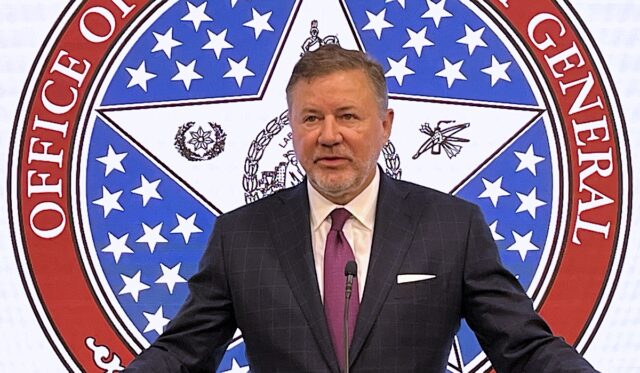

(Update: On Tuesday, Aug. 8, Attorney General Gentner Drummond announced his selection of the Foshee & Yaffe law firm to represent the state in anticipated Winter Storm Uri litigation. The following article remains in its original form.)
More than two years after the historic Winter Storm Uri demolished tree lines, froze energy infrastructure and created a natural gas price spike that has saddled ratepayers with billions of dollars and two decades’ worth of securitized debt, Oklahoma Attorney General Gentner Drummond announced today that he is taking bids for private law firms to represent the state in potential litigation against companies that profited immensely from selling gas at inflated prices.
“It is important to understand that our oil and gas industry is not to blame. It is equally important to understand that our utility companies are not to blame. But make no mistake, there are, indeed, guilty parties who are to blame. After careful and diligent review of the conduct during Winter Storm Uri, it is clear to me that several companies reaped billions of dollars at the expense of Oklahoma families and businesses,” Drummond said. “The magnitude of this scheme is staggering and unconscionable. The conduct in question is well outside the parameters and boundaries of ordinary capitalism.”
Drummond is the third attorney general to review the matter. In 2021, months before he suddenly resigned, Attorney General Mike Hunter hinted that certain corporate parties had acted unscrupulously — and potentially illegally — when selling within the volatile natural gas market that saw wholesale prices climb 30-fold between Feb. 13 and 17.
Hunter’s successor, Attorney General John O’Connor, also said his office was investigating what had happened, but O’Connor’s efforts appeared to stall after bungled February 2022 correspondence with local petroleum companies that threatened litigation for price gouging under a suspect legal interpretation that attempted to argue natural gas is not a petroleum product.
Drummond defeated O’Connor in the June 2022 Republican primary election, and he said Tuesday that his review leading up to anticipated litigation on the topic arose “de novo,” or independent of O’Connor’s work.
“There are other parties that were affiliated with this (…) entities such as natural gas marketers,” Drummond said. “If you follow the data, it appears as though there was a short squeeze prior to Uri [when] the supply was restricted when the demand was the greatest.”
Asked about the potential for criminal prosecution in addition to civil pursuit of financial compensation, Drummond said there are “no parameters” to his inquiry.
“There is this alleged free market, and it’s worked beautifully for hundreds of years across Europe and America. And in this case, what it appears is though (there was), as I mentioned, a short squeeze, where those who supply the gas manipulated the supply to reduce it in anticipation of our greatest need during Winter Storm Uri. So, certainly, natural gas marketers could do it again. And I would sue them.
“I think generally, most of the companies that manipulated the marketing price are outside of Oklahoma — and some international companies.”
The Australian company Macquarie Energy has been sued by the state of Kansas, by a utility in the state of Texas, and by ExxonMobil for its alleged actions related to gas market manipulation during Winter Storm Uri. Macquarie profited to the bottom line of hundreds of millions of dollars during the price spike.
Drummond declined to name specific companies under scrutiny, but a list of entities that sold Oklahoma power utilities gas during that time — including some with “marketing” in their name — is posted on the Oklahoma Corporation Commission’s website.
“I am aware of what Texas and Kansas are doing, and I think we will do it better,” Drummond said when asked if the matter could turn into multi-state litigation.
Reactions to Drummond’s potential Winter Storm Uri litigation
Drummond’s office posted a 35-page request for proposal online Tuesday seeking applications from tort-focused law firms interested in pursuing the state’s interests in the Winter Storm Uri gas price matter. In explaining his need to hire a firm to increase his office’s capacity to handle the potential cases, Drummond said he would follow the guidelines of a law passed in 2022 imposing transparency requirements and contingency fee caps on third-party attorney contracts. (Asked if he knew whether all state agencies — including Gov. Kevin Stitt’s office — are complying with the online posting requirements of that law, Drummond simply replied, “No.”)
Drummond said he might make a decision on a contracted law firm by the end of the month, but he said he could not speculate about a timeline beyond that.
“It will probably be the most significant lawsuit filed by the state of Oklahoma in its history,” Drummond said.
Asked about what had previously been the largest litigation pursued by the state of Oklahoma — cases against opioid manufacturers, including a voided verdict against Johnson & Johnson — Drummond said that matter was not concluded, although he said he would reserve updates for a separate press conference.
Sean Voskuhl, the Oklahoma state director of the AARP, praised Drummond’s announcement.
“Attorney General Drummond’s intention to take potential legal action over alleged market manipulation during Winter Storm Uri is welcome news for utility customers and AARP members in Oklahoma. Frustrated utility customers are demanding to know why they are paying for a ‘once-in-a-generation’ storm for decades,” Voskuhl said. “The companies who reaped billions of dollars on the backs on hard-working Oklahomans must be held accountable. Oklahoma utility customers want action to be taken against the companies who bilked customers out of billions of dollars in a matter of days during Winter Storm Uri and further demand the recovered funds are returned to customers immediately.”
Oklahoma Corporation Commissioner Kim David, who took office in January after 12 years of service in the State Senate, also thanked Drummond for his efforts, and she noted that that Oklahoma law does not specifically allow the state’s regulatory agency to review suppliers’ sale records involving natural gas.
“Shortly after joining the OCC, I formally asked Attorney General Gentner Drummond to investigate possible market manipulation by natural gas marketers during Winter Storm Uri. I appreciate today’s announcement by the attorney general concluding that market manipulation most likely occurred by certain natural gas marketers during Winter Storm Uri to artificially increase the price of natural gas. Additionally, I am thankful for confirmation that no wrongdoing was done by the Corporation Commission, Oklahoma’s regulated utilities, or the producers of oil and gas,” David said. “Importantly, the attorney general confirmed what I have known all along, that the OCC lacks the authority to investigate these marketers and his office is capably handing this matter. While today’s announcement is only the first step towards holding these marketers accountable for their actions, it is my hope that all determined overpayments be returned to Oklahoma ratepayers.”
Drummond said if Oklahoma’s potential litigation against natural gas marketers proves successful, there are mechanisms by which the proceeds not claimed by the contracted law firms would be used to pay down the securitized debt owed by ratepayers of OG&E, Public Service Company of Oklahoma and other entities that bundled their obligations and sold them through the Oklahoma Development Finance Authority to spread bill increases out over the next 20-plus years.
Meanwhile, Drummond said policymakers may ultimately give further examination to proposals that could limit the likelihood of future price spikes for Oklahoma utilities, which have a “moral and legal obligation” to purchase fuel for the provision of electricity to their customers, no matter the market cost.
“I think what we’ll see in the future is a consideration of market hedging and physical hedging and diversity in sources of energy,” Drummond said.




















